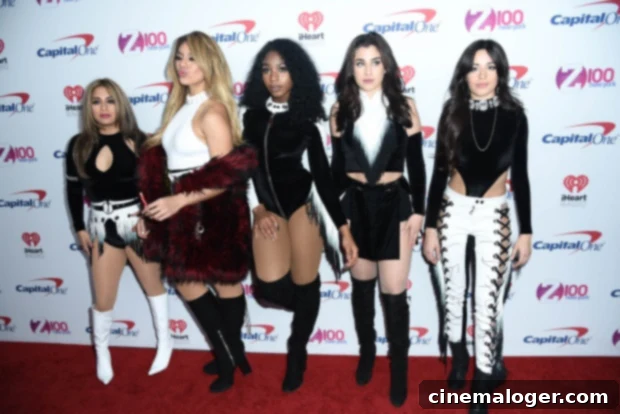Normani Unfiltered: Recalling Fifth Harmony Challenges Before Solo Album ‘Dopamine’
Before the highly anticipated release of her debut solo album, ‘Dopamine,’ global superstar Normani is offering fans an intimate look back at her tumultuous journey through the music industry. The artist, celebrated for her powerful vocals and mesmerizing stage presence, is reflecting on the highs, but more pointedly, the significant lows she experienced during her tenure in the immensely popular girl group, Fifth Harmony. Her candid revelations shed light on the pressures, artistic constraints, and personal struggles that shaped her path, providing crucial context for the independent artistry showcased in her upcoming project.
The journey to ‘Dopamine’ has been a long and introspective one for Normani, whose full name is Normani Kordei Hamilton. As she prepares to unveil her first full-length solo effort, the singer, now 27, has chosen to open up about the foundational experiences that led her to this moment. In a revealing interview with The Cut, published on April 30, Normani spoke with a newfound candor about her early days in the spotlight, beginning with her initial excitement at being selected for a girl group, a dream for many aspiring artists.
The Genesis of a Pop Phenomenon: From X Factor to Fifth Harmony
Normani’s story began in 2012, like many pop stars of her generation, on the competitive stage of The X Factor. During her individual audition, she initially faced elimination. However, a pivotal moment in reality TV history saw judges Britney Spears, L.A. Reid, Demi Lovato, and Simon Cowell make the transformative decision to unite five talented young women into a new vocal ensemble. This impromptu formation brought together Dinah Jane, Lauren Jauregui, Camila Cabello, Ally Brooke, and Normani herself, eventually leading to the creation of Fifth Harmony. The group quickly captured the public’s imagination, signing a joint record deal under Reid’s label Epic Records, in partnership with Simon Cowell’s Syco Music, setting the stage for what would become a global pop phenomenon.
Recalling those formative years, Normani admits that her initial reaction to joining the group was one of genuine enthusiasm and relief. “I didn’t want to be at the forefront,” she confessed to The Cut, expressing a desire to be part of a collective rather than the sole focus. This perspective is understandable for a young artist navigating the daunting landscape of the music industry. The idea of shared responsibility, camaraderie, and a collective dream often appeals to those entering the demanding world of entertainment. However, this initial optimism, as she reveals, began to wane as the realities of the industry and her role within the group became starkly clear.
Beyond the Glitz: Feeling Like a “Token” and Suppressed Artistic Control
As Fifth Harmony ascended to global stardom, accumulating hit singles and millions of fans, Normani’s personal experience diverged sharply from the group’s public image of unity and success. The singer candidly shared how her early comfort in a collective role gradually eroded, replaced by an unsettling feeling of being a “token.” This sentiment, a common but rarely discussed struggle for artists from marginalized communities in the entertainment industry, suggests she felt used to fulfill a quota or maintain an image, rather than being genuinely valued for her unique contributions and artistic vision. It speaks to the systemic issues within the industry where diversity is often performative rather than truly inclusive, leading to a profound sense of isolation and otherness for the individual artist.
Further exacerbating this feeling was the alleged absence of artistic control within Fifth Harmony. According to Normani, her “time in the group” felt akin to a “prison sentence ordered and duly served.” This powerful metaphor underscores the severity of her experience, painting a picture of an environment where creative expression was stifled. She alleged that the members had no genuine say in their own music, lyrics, or overall artistic direction. Instead, they were “simply given records and told to sing them.” This common practice in the pop music machine, especially for girl groups molded by reality TV, often prioritizes commercial viability and predefined images over genuine artistic input from the artists themselves. For an artist like Normani, whose passion lies in authentic self-expression and creative autonomy, this lack of agency proved profoundly disheartening and ultimately unsustainable.
The Scars of Online Abuse: A Dark Chapter in Her Career
The challenges Normani faced within the group were compounded by an onslaught of vicious online abuse, reaching a harrowing peak in the summer of 2016. The catalyst for this traumatic experience was an innocuous comment she made during an interview, where she casually described fellow group member Camila Cabello as “quirky” and “cute.” What was intended as a lighthearted observation was twisted by some zealous fans into a perceived “dig,” igniting a firestorm of negativity that quickly escalated into a torrent of hateful messages, including death threats, directed at Normani’s social media inboxes. This incident highlighted the dangerous extremes of stan culture, where idolization can quickly turn into aggression and even hatred, often targeting artists for perceived slights or rivalries.

The severity of the abuse was not lost on her family, who witnessed her suffering firsthand. Normani’s mother, Andrea Hamilton, shared her profound distress with The Cut, recalling the horrifying images she encountered online. “I remember going on social media and seeing my daughter’s face Photoshopped on bodies of people being whipped,” she revealed, highlighting the deeply disturbing and racially charged nature of some of the attacks. This level of hatred, fueled by obsessive fan culture and amplified by the anonymity of social media, transcended mere criticism, becoming a deeply personal and psychologically damaging ordeal. It exposed the dark underbelly of fame and the often-unregulated landscape of online harassment, particularly for women and artists of color who disproportionately bear the brunt of such vitriol and targeted abuse.
Industry Indifference: The Show Must Go On
Perhaps even more distressing than the abuse itself was the alleged response—or lack thereof—from the record label and management responsible for Fifth Harmony. According to Normani, during this terrifying period, “nobody from the record label reached out.” This startling claim suggests a stark indifference from those meant to protect and support their artists through crises. Instead of intervention, mental health support, or even basic empathy, it was “just business as usual.” This revelation casts a critical light on the music industry’s priorities, often placing profits and tour commitments above the mental and emotional well-being of its talent, especially when navigating the volatile landscape of public scrutiny and fan aggression.
Normani recounted the chilling expectation she faced: “We just continued to do shows and I was fearing for my life. But they continued to put me out there on the stage. It was pretty much like, ‘The show goes on.’” This “show must go on” mentality, while a long-standing tradition in entertainment, takes on a sinister tone when an artist is actively receiving death threats and experiencing significant psychological distress. Being forced to perform under such immense pressure, feeling vulnerable and unprotected, left a lasting impact. Normani unequivocally states, “It was probably the lowest point for me,” a powerful testament to the emotional and mental toll exacted by this period of her career. This experience underscores a critical flaw in how some parts of the industry treat young artists, often neglecting their humanity in pursuit of relentless commercial success and the maintenance of a public image.
The Road to ‘Dopamine’: Crafting Her Own Narrative
Now, with the difficult chapters of her past behind her, the “Motivation” singer is firmly focused on the future. Her highly anticipated debut solo album, ‘Dopamine,’ represents not just a musical project, but a profound statement of independence and self-reclamation. She expresses immense excitement for her fans to finally hear the new music—music that has been meticulously crafted on her own terms, free from the constraints and pressures she previously faced. This artistic autonomy is a cornerstone of her current creative process, allowing her to infuse her authentic voice and vision into every track, a stark contrast to her earlier experiences of having little creative input.
While the album’s completion took longer than some fans and industry observers might have anticipated, Normani asserts that this extended timeline was not a delay, but a necessary period of profound personal growth and self-discovery. “For so long, I allowed music, numbers, and how successful I am to define me,” she reflected. Her journey to ‘Dopamine’ became an opportunity to step back from external validation and truly understand herself outside of the metrics of fame and commercial success. She explains that she simply “needed time to actually live for herself.” This crucial space allowed her to experience life beyond the confines of a pop group and the relentless demands of the industry, gathering genuine experiences and emotions that now infuse her new music with unparalleled depth, authenticity, and personal resonance.
Embracing Authenticity and Redefining Success
The creation of ‘Dopamine’ has been a transformative process for Normani, symbolizing a pivotal shift in her approach to both her career and her personal life. She highlights the wealth of experiences she has gained during this period: “There’s so much life I’ve lived in the span of creating this body of work.” This sentiment speaks to a broader realization that artistic output is deeply intertwined with personal well-being and genuine lived experience. By stepping away from the relentless cycle of releases and performances, she was able to cultivate a stronger sense of self, ensuring that her debut album would be a true reflection of who she is today, rather than a commercially manufactured product dictated by others.
Her journey offers a powerful message about resilience, the paramount importance of artistic integrity, and the often-overlooked mental health challenges faced by young artists in the unforgiving spotlight. Normani’s willingness to share her vulnerabilities, from feeling like a “token” to enduring terrifying online abuse, not only enriches the narrative surrounding ‘Dopamine’ but also contributes to a larger, crucial conversation about systemic issues in the music industry. As she embarks on this new chapter, with her debut album poised to make a significant impact, Normani stands as an artist who has not only survived but thrived, reclaiming her voice and crafting a legacy built on authenticity, strength, and unwavering artistic self-determination.
